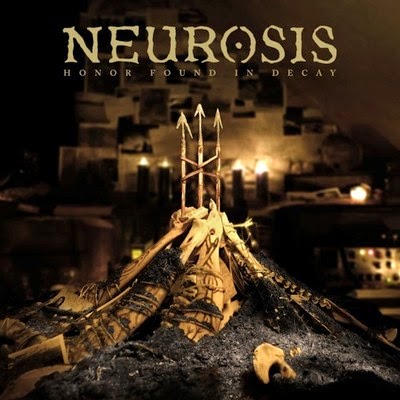Beware a double-edged sword...
 Today's metal music follows postmodern trends just like any other branch of culture and therein lies the cause of its focus on eclecticism. It's neither a bad nor a good thing in itself but it is, in all certainty, inevitable. Now, some bands have proven capable of turning this artistic philosophy into something truly special and sometimes even innovative. All too often, however, the pursuit of diversity comes at the expense of artistic identity. And well, the new album sees A Forest of Stars doing just that: struggling to keep their unique style intact while adding new elements to the mix. And yeah, well, the whole image sort of went out of focus.
Today's metal music follows postmodern trends just like any other branch of culture and therein lies the cause of its focus on eclecticism. It's neither a bad nor a good thing in itself but it is, in all certainty, inevitable. Now, some bands have proven capable of turning this artistic philosophy into something truly special and sometimes even innovative. All too often, however, the pursuit of diversity comes at the expense of artistic identity. And well, the new album sees A Forest of Stars doing just that: struggling to keep their unique style intact while adding new elements to the mix. And yeah, well, the whole image sort of went out of focus.
With their steam-powered, victorian/occult/psychedelic, british-to-the-bones “doomened” black metal, A Forest of Stars used to stand out from other post black metal bands. Their sound on Opportunistic Thieves of Spring was both singular and wonderfully consistent - the album simply felt genuine for lack of a better word. Same goes for a little bit more diverse and folky A Shadowplay for Yesterdays which still had a distinct, unique feel to it despite its numerous influences. Adding new elements to the sound they’ve already established was certainly the easiest way to go but also the least fortunate. While the band’s latest offering is not a bad record in itself - quite the opposite, actually! - it falls short of what I wished to hear. The core sound is still as amazing as it used to be. Folk parts are mesmerizing as ever and black metal passages as passionate and ferocious (just listen to the first half of "Hive Mindless"!). Ironically, the first track is the biggest showpiece of what went wrong - none of the tracks that follow are as messy style-wise as this one. To cut a long story short, in addition to the usual elements, there are post-rock, classic prog, psychedelic rock (Pink Floyd), prog metal and avant-metal (most notably Unexpect) influences in the song and the whole album.
All that may sound promising on paper and works pretty well in practice, but after listening to the whole thing I found myself underwhelmed with its obvious lack of focus. You see, the strength of their previous albums paradoxically lies in their ability to build something new and solid upon their diverse influences, not in adding them up. While I can see that the more surreal, elusive and complex nature of the music was intended, the band’s identity totters under weight of the ambition it has to carry.
